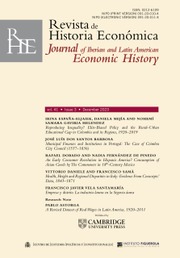Article contents
PHILIP II AGAINST THE CORTES AND THE CREDIT FREEZE OF 1575-1577*
Published online by Cambridge University Press: 04 March 2016
Abstract
Numerous archival documents show how the suspension of payments by Philip II, in September 1575, on the contracts with Genoese bankers (asientos) induced a freeze of the domestic credit market in Castile through the bankers’ intermediation for asientos and the credit interconnections. Commercial fairs stopped, banks failed and trade suffered while the king granted legal protection to the Genoese bankers. The evidence strikingly confirms that by his strategy, Philip II was able to remove the de facto ceiling on the domestic debt (juros) imposed by the fixed revenue commitment of the Castilian cities in the Cortes. The agreement with the bankers was signed in December 1577 immediately after the cities had agreed to the doubling of their commitment.
Resumen
La documentación archivística muestra que el decreto de suspensión de consignaciones de 1575-77 paralizó el mercado de crédito de Castilla por la estrecha relación que había entre los asientos de los banqueros del rey y el crédito local. Durante esos años, las ferias dejaron de celebrarse, muchos bancos locales quebraron y el comercio sufrió una grave parálisis, pero el rey no dudó en proteger a sus banqueros de sus acreedores castellanos. La documentación confirma que gracias a esta estrategia, Felipe II logró romper el techo de su deuda pública (juros) que dependía de la contribución fiscal de las ciudades reunidas en las Cortes de Castilla. El acuerdo con los banqueros no se firmó hasta Diciembre de 1577, sólo inmediatamente después de que las ciudades hubiesen aceptado duplicar su contribución.
Keywords
Information
- Type
- Articles/Artículos
- Information
- Revista de Historia Economica - Journal of Iberian and Latin American Economic History , Volume 34 , Supplement 3 , December 2016 , pp. 351 - 382
- Copyright
- © Instituto Figuerola, Universidad Carlos III de Madrid, 2016
Footnotes
Financial support was received from the Ministry of Economy and Competitiveness (Spain) Project ECO2012-38028, Project HAR2012-39034-C03-02. Chamley gratefully acknowledges the support of the Banco Santander through a Chair of Excellence at the University Carlos III.
Departamento de Ciencias Sociales and Instituto Figuerola, Universidad Carlos III de Madrid, Calle Madrid, 126, 28903 Getafe, Madrid, Spain. carlos.alvarez@uc3m.es
Department of Economics, Boston University, 270 Bay State Road, Boston, MA 02215, USA. chamley@bu.edu
References
REFERENCES
A correction has been issued for this article:
- 9
- Cited by
Linked content
Please note a has been issued for this article.


